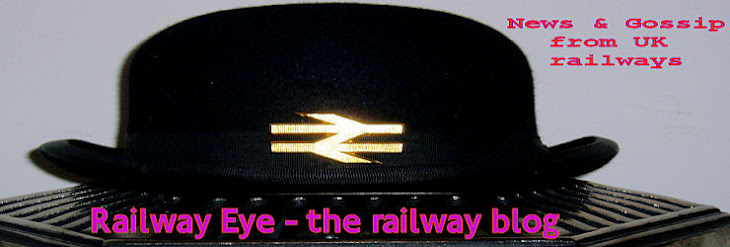This from the ORR...
REGULATOR PROSECUTES NETWORK RAIL AND JARVIS RAIL OVER POTTERS BAR DERAILMENT
The Office of Rail Regulation (ORR) has today started criminal proceedings against Network Rail Infrastructure Limited and Jarvis Rail Limited for breaches of health and safety law which caused the Potters Bar derailment.
The prosecutions follow the conclusion of the inquest and ORR's investigation into the derailment of a West Anglia Great Northern express train at Potters Bar station in Hertfordshire on 10 May 2002. Seven people were killed, with many more seriously injured.
Network Rail Infrastructure Limited is facing a charge under section 3(1) of the Health and Safety at Work etc. Act 1974 (HSWA). This results from its failure, as infrastructure controller for the national rail network, to provide and implement suitable and sufficient training, standards, procedures and guidance for the installation, maintenance and inspection of adjustable stretcher bars.
Jarvis Rail Limited is also facing a charge under section 3(1) of HSWA. This results from its failure, as infrastructure maintenance contractor for the relevant section of the national rail network, to provide and implement suitable and sufficient training, standards, procedures and guidance for the installation, maintenance and inspection of adjustable stretcher bars.
Ian Prosser, director of rail safety at ORR said:
“The conclusion of the recent inquest into the derailment at Potters Bar has allowed the regulator to make a decision on whether any enforcement action should be brought in relation to the incident.
“I have decided there is enough evidence, and it is in the public interest, to prosecute Network Rail and Jarvis Rail for serious health and safety breaches. For the sake of the families involved, we will do all we can to ensure the prosecutions proceed as quickly as possible.
“The railway today is as safe as it has ever been, but there can be no room for complacency. Where failings are found those at fault must be held to account – and the entire rail industry must continue to strive for improvements to ensure that public safety is never put at a similar risk again.”
The first appearance is due to take place at Watford Magistrates’ Court on 7 January 2011 at 11am.
Notes to editors:
1. At the time of the incident the infrastructure controller for the national rail network was Railtrack plc (in administration). Railtrack plc (in administration) was taken over by Network Rail Limited in October 2002 and later renamed Network Rail Infrastructure Limited.
2. In May 2002, Jarvis Rail Limited was the infrastructure maintenance contractor for the Potters Bar area of the national rail network. Jarvis Rail went into administration in March 2010.
3. The train that derailed was the West Anglia Great Northern 12.45pm Cambridge Cruiser service from King's Cross to King's Lynn.
4. On 17 October 2005 the Crown Prosecution Service (CPS) announced that, after consideration of the evidence, it had advised the British Transport Police (BTP) that there was no realistic prospect of conviction for an offence of gross negligence manslaughter against any individual or corporation arising from the Potters Bar incident.
5. In February 2007, following a fatal derailment of a train at Grayrigg, the inquest into the fatalities at Potters Bar was adjourned, pending the decision of the Secretary of State for Transport on whether a public inquiry or joint inquest should be held into the Potters Bar and Grayrigg incidents. In June 2009 the Secretary of State for Transport decided that separate inquests should be held into the Potters Bar and Grayrigg incidents.
6. As a signatory to the Work Related Death Protocol, ORR has agreed not to prosecute for health and safety offences prior to an inquest unless waiting for the inquest to be completed would prejudice the case. A copy of the protocol can be found at: http://www.hse.gov.uk/pubns/misc491.pdf
7. The inquest into the deaths at Potters Bar took place during June and July 2010; the jury returned seven verdicts of accidental death.
8. In October 2010 the CPS informed ORR that it had decided that there were no grounds for it to reconsider its decision of October 2005.
9. Network Rail Infrastructure Limited is facing one charge that, between 31 March 2001 and 11 May 2002, it failed to conduct its undertaking as the infrastructure controller for the national rail network in such a way as to ensure, so far as was reasonably practicable, that persons not in its employment who may be affected thereby were not exposed to risks to their safety, in that it failed to provide and implement suitable and sufficient training, standards, procedures, guidance or other specifications for the installation, maintenance and inspection of shallow-depth adjustable stretcher bar points.
10. Jarvis Rail Limited is facing one charge that, between 31 March 2001 and 11 May 2002, it failed to conduct its undertaking as infrastructure maintenance controller for the East Coast Main Line section of the national rail network in such a way as to ensure, so far as was reasonably practicable, that persons not in its employment who may be affected thereby were not exposed to risks to their safety, in that it failed to provide and implement suitable and sufficient training, standards, procedures, guidance or other specifications for the installation, maintenance and inspection of shallow-depth adjustable stretcher bar points.
11. Adjustable stretcher bars keep the moveable section of track at the correct width for the train's wheels.
12. The decision to prosecute has been made in accordance with ORR’s Enforcement Policy Statement, the Enforcement Management Model and the Code for Crown Prosecutors.
13. The maximum penalty the magistrates’ court can impose for each charge is a fine of £20,000. If the case is committed to the Crown Court the maximum penalty that may be imposed for each charge is an unlimited fine.
ENDS
